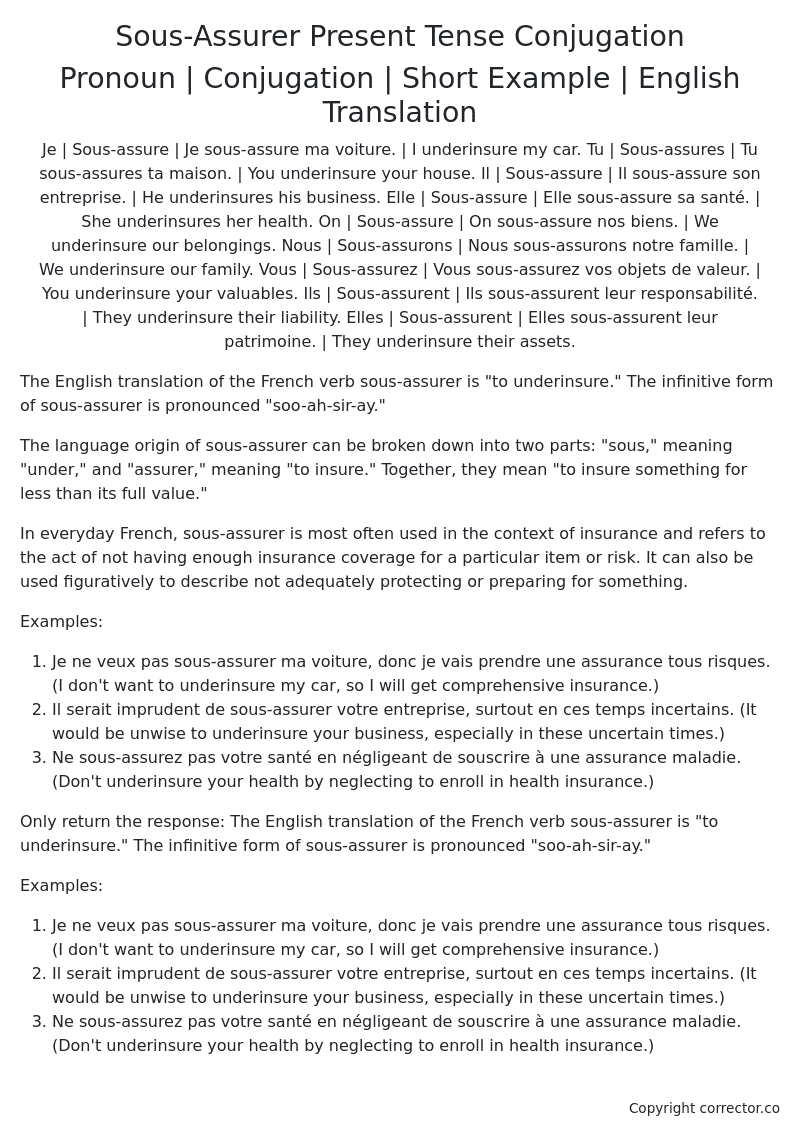Le Present (Present Tense) Conjugation of the French Verb sous-assurer
Introduction to the verb sous-assurer
The English translation of the French verb sous-assurer is “to underinsure.” The infinitive form of sous-assurer is pronounced “soo-ah-sir-ay.”
The language origin of sous-assurer can be broken down into two parts: “sous,” meaning “under,” and “assurer,” meaning “to insure.” Together, they mean “to insure something for less than its full value.”
In everyday French, sous-assurer is most often used in the context of insurance and refers to the act of not having enough insurance coverage for a particular item or risk. It can also be used figuratively to describe not adequately protecting or preparing for something.
Examples:
- Je ne veux pas sous-assurer ma voiture, donc je vais prendre une assurance tous risques. (I don’t want to underinsure my car, so I will get comprehensive insurance.)
- Il serait imprudent de sous-assurer votre entreprise, surtout en ces temps incertains. (It would be unwise to underinsure your business, especially in these uncertain times.)
- Ne sous-assurez pas votre santé en négligeant de souscrire à une assurance maladie. (Don’t underinsure your health by neglecting to enroll in health insurance.)
Only return the response:
The English translation of the French verb sous-assurer is “to underinsure.” The infinitive form of sous-assurer is pronounced “soo-ah-sir-ay.”
Examples:
- Je ne veux pas sous-assurer ma voiture, donc je vais prendre une assurance tous risques. (I don’t want to underinsure my car, so I will get comprehensive insurance.)
- Il serait imprudent de sous-assurer votre entreprise, surtout en ces temps incertains. (It would be unwise to underinsure your business, especially in these uncertain times.)
- Ne sous-assurez pas votre santé en négligeant de souscrire à une assurance maladie. (Don’t underinsure your health by neglecting to enroll in health insurance.)
Sous-Assurer – About the French Present Tense
To take a deep dive into all the French tenses then see our article on Mastering French Tense Conjugation.
Common Everyday Usage Patterns For Le Present
Interactions with Other Tenses
Table of the Present Tense Conjugation of sous-assurer
Pronoun | Conjugation | Short Example | English Translation
Je | Sous-assure | Je sous-assure ma voiture. | I underinsure my car.
Tu | Sous-assures | Tu sous-assures ta maison. | You underinsure your house.
Il | Sous-assure | Il sous-assure son entreprise. | He underinsures his business.
Elle | Sous-assure | Elle sous-assure sa santé. | She underinsures her health.
On | Sous-assure | On sous-assure nos biens. | We underinsure our belongings.
Nous | Sous-assurons | Nous sous-assurons notre famille. | We underinsure our family.
Vous | Sous-assurez | Vous sous-assurez vos objets de valeur. | You underinsure your valuables.
Ils | Sous-assurent | Ils sous-assurent leur responsabilité. | They underinsure their liability.
Elles | Sous-assurent | Elles sous-assurent leur patrimoine. | They underinsure their assets.
Other Conjugations for Sous-Assurer.
Le Present (Present Tense) Conjugation of the French Verb sous-assurer (this article)
Imparfait (Imperfect) Tense Conjugation of the French Verb sous-assurer
Passé Simple (Simple Past) Tense Conjugation of the French Verb sous-assurer
Passé Composé (Present Perfect) Tense Conjugation of the French Verb sous-assurer
Futur Simple (Simple Future) Tense Conjugation of the French Verb sous-assurer
Futur Proche (Near Future) Tense Conjugation of the French Verb sous-assurer
Plus-que-parfait (Pluperfect) Tense Conjugation of the French Verb sous-assurer
Passé Antérieur (Past Anterior) Tense Conjugation of the French Verb sous-assurer
Futur Antérieur (Future Anterior) Tense Conjugation of the French Verb sous-assurer
Subjonctif Présent (Subjunctive Present) Tense Conjugation of the French Verb sous-assurer
Subjonctif Passé (Subjunctive Past) Tense Conjugation of the French Verb sous-assurer
Subjonctif Imparfait (Subjunctive Imperfect) Tense Conjugation of the French Verb sous-assurer
Conditionnel Présent (Conditional Present) Tense Conjugation of the French Verb sous-assurer
Conditionnel Passé (Conditional Past) Tense Conjugation of the French Verb sous-assurer
L’impératif Présent (Imperative Present) Tense Conjugation of the French Verb sous-assurer
L’infinitif Présent (Infinitive Present) Tense Conjugation of the French Verb sous-assurer
Struggling with French verbs or the language in general? Why not use our free French Grammar Checker – no registration required!
Get a FREE Download Study Sheet of this Conjugation 🔥
Simply right click the image below, click “save image” and get your free reference for the sous-assurer Present Tense tense conjugation!

I hope you enjoyed this article on the verb sous-assurer. Still in a learning mood? Check out another TOTALLY random French verb present conjugation!


